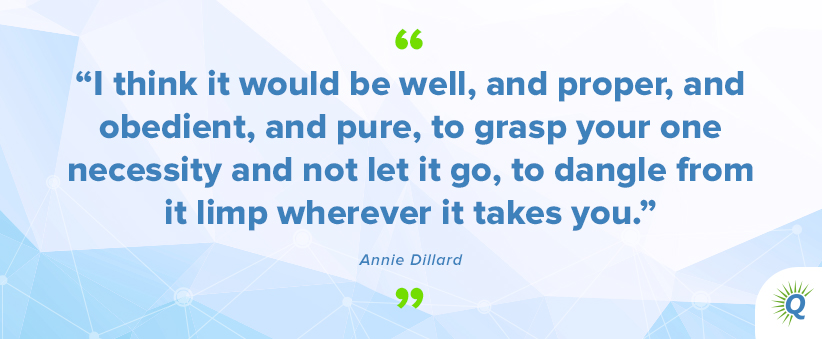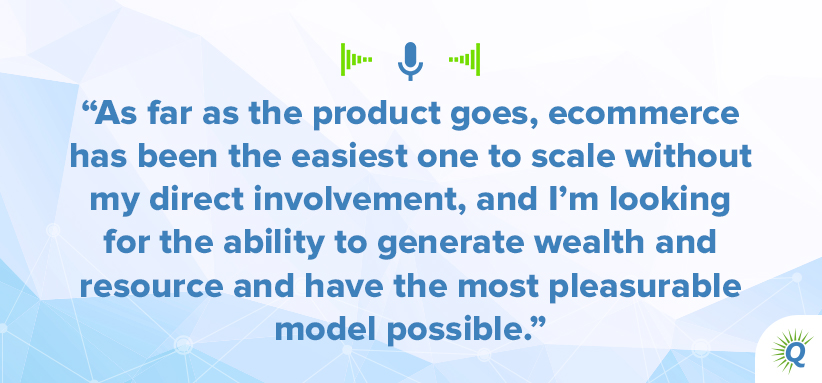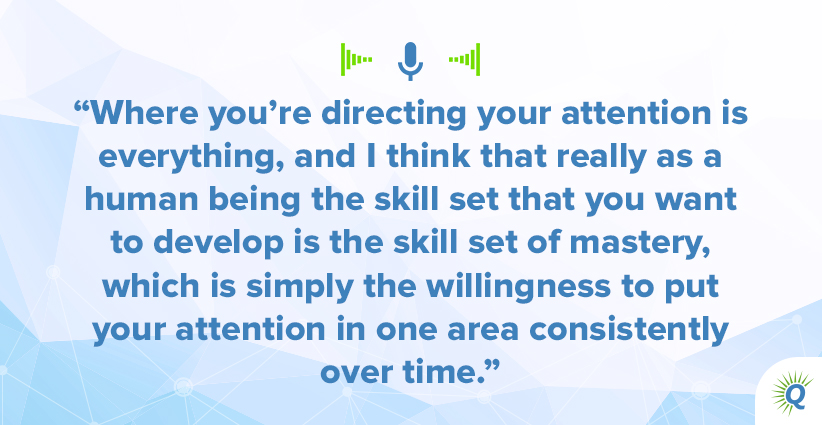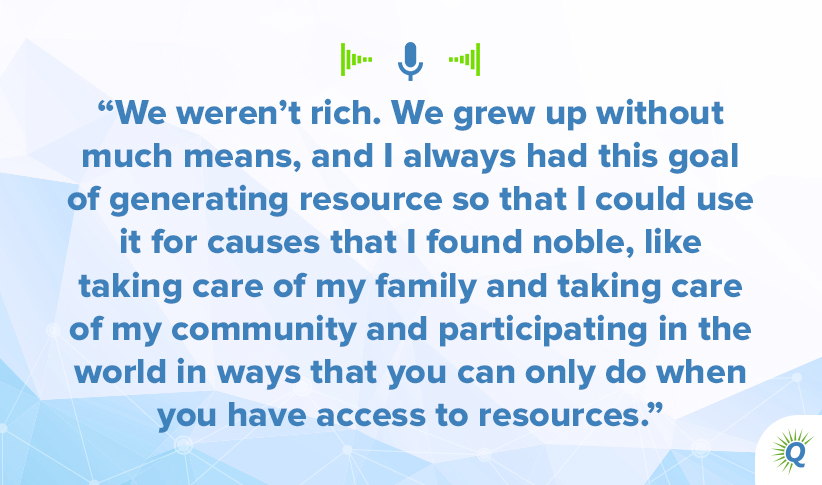Topics:
Never Miss a Beat - Get Updates Direct to Your Inbox
FILTER:


The Entrepreneur’s Guide To An Easier Life
By Quiet Light
Selling a business is like bottling whiskey. Timing isn’t the only factor, but it’s an important one.
Whiskey needs time to mellow in the barrel, but leave it too long and you could end up with hints of old wet log.
Waiting until you’re limping toward the edge of exhaustion and breakdown to sell can likewise be a big mistake.


Listen to the Source of this Post:
This blog post is based on a podcast episode that we recently recorded. Listen to the full episode here:So much has already been said about the stress of being an entrepreneur – from the relentless compulsion towards happiness at all cost to the bar that’s always raised just out of reach.
And when one of the high-profile among us starts to show cracks from the pressure, what’s the story that gets told over and over again? The story of a life lived in overdrive.
Look behind the scenes of most successful ventures, and there does seem to be a passion-fueled force that compels its founder.
Often, as humans we’re encouraged to celebrate that force.


Other times, we’re warned about the dangers of it.
It makes you wonder… Is it unreasonable to expect that we can reach for the highest heights while still keeping our feet on the ground?
Is it just the destiny of the stars in our business universe to burn white and hot and then blaze out? In other words, is burnout even avoidable?
Online marketing expert Ezra Firestone believes that it is, and he advocates for a sustainable version of success that revolves around the pursuit – not of happiness at all cost – but of authentic well-being instead.
To hear him talk, he’s been on something of a quest over the years since leaving home as a young person to play poker in New York.
What’s he been after? All the right things – like a satisfying work-life balance, health of body and community, and the wealth and resources required to have the impact that you want to have on the world.
Basically, he’s been after a formula for success in business and in life.
And his tag-line at Smart Marketer neatly encapsulates the formula he’s arrived at: Serve the world unselfishly and profit.
It’s a formula that definitely works. Ezra started his first online store in 2007, and now runs a select group of businesses with annual revenues of over $20 million. Those include his subscription site, Smart Marketer; the physical-products business, BOOM!; and the SaaS business, Zipify Apps.


After soaking up Ezra’s conversation with Joe this week, I’ve distilled his wisdom around these four areas of focus:
- Your Business Model
- Your Branding
- Your Role in the Business
- Your Role in the World
Then assembled it into this mini-guide to making life easier as an entrepreneur… so that you can be more effective and have more of what you really want.
Then when you do sell your business, you can take your passion and profits and funnel them into the next worthy goal rather than taking years to recover.
How do you avoid burnout and stay effective as a business owner, but still have a good time doing it? Start by learning these four things:
- How to Simplify Your Business Model
- How to Communicate Consistently and Add Value to the Conversation
- How to Transition from Driver to Navigator in Your Business
- How to Leverage the Resources Around You
How to Simplify Your Business Model
Ezra points out that your business model is central – not just to your profits and revenue – but to your sanity as well.


The reason he loves the ecommerce (products-based) model is due to its simplicity. He sees an ecommerce business as composed of 3 essential parts:
- Supply Chain (products, packaging, logistics, etc.)
- Support (customer service, UX, payment processing, etc.)
- Marketing (content, storytelling, social media, etc.)
This ability to simplify and streamline something that otherwise can seem vastly complex belies the genius behind it.
When you break your business model into its component parts, you’re essentially applying systems-thinking. And systems-thinking can be a lifesaver.
It helps you focus your attention where it matters most and leverage your time.
At BOOM!, for example, Ezra applies his marketing skills (the area he excels at most) to a physical-products business, and then tries to keep the supply and support side of the business as simple as possible.
Meanwhile, the strategy of simplicity coordinates perfectly with the central mission of the brand and overall goal of its target market.


Experts say to simplify your businesses processes you should:
- Determine your central goal or mission and make sure all processes align with that one goal.
- Check every business operation for fillers and fluff and remove any function or component that doesn’t achieve the central mission.
For example, look for underperforming SKUs or demographics and eliminate them from your marketing efforts.
Often businesses are over-armed with technology and tools they don’t need or don’t use to full capacity. Again, if it doesn’t fit with your central goal, be ruthless about getting rid of it.
The more you simplify processes and procedures, the more effective you’ll be, and the easier your life becomes.
Plus, in many cases you’ll make your business more valuable as a sellable asset, because buyers will see an easier road ahead of them if they were to take over.
Two classic books on applying systems-thinking to your business:
- Work the System by Sam Carpenter
- E-myth Revisited by Michael Gerber


This podcast at Smart Marketer with James Schramko also has a great discussion on choosing and simplifying the tools you use in your business (around the 36-minute mark).
How to Communicate Consistently and Add Value to the Conversation
The crux of your brand is the experience you create for your customers.
Marketing has always been about communicating and staying on message, but now it’s about engaging customers and keeping them engaged.
That’s as much about listening as it is about talking, and possibly more about entertaining than ever. And by entertaining, I don’t just mean making your customers laugh (although humor is a great strategy), but I mean evoking a strong emotional response from your audience.
Ezra points out that your customers are already engaged in a conversation online. And he sums up your task as an online marketer beautifully:
“I feel like every business that I have is serving a particular group of people who are having a collective experience, and my goal as a marketer is to comment on that experience in a way that resonates with that particular group of people who’re having that experience and then push them in the direction of my products, ultimately.”
In the case of BOOM!, for example, the company joins the conversation of women over 50 who are experiencing aging and are being told that aging is wrong by the mainstream culture.


Not only does the company join the conversation, but in many cases they’re putting themselves in the place of leading the conversation and encouraging customers to join in.
Again, remember the last point and keep it simple. That means speak up or out in a way that will resonate with and capture the hearts and minds of that group of people (your target market) only.
And keep the topic on the common experience they’re having or problem they may be facing, and you won’t go wrong.
Here’s Ezra’s strategy in a nutshell:
- Create and promote weekly relevant content and include a sale campaign every 6 weeks.
- Make it as easy as possible for your audience to consume your content by sending it via email, Facebook ads that target visitors to your website, Manychat that broadcasts content via Messenger, and Pushcrew that sends desktop and mobile notifications to subscribers.


That’s it! Branding made simple.
Considering that messaging apps, chatbots, and live chat support continue to grow in popularity and importance daily, and as purchasing within messaging platforms is predicted to become commonplace, knowing how to engage your customers and how best to join the conversations they’re already having is more critical now than ever.


How to Transition from Driver to Navigator in Your Business
Transitioning to the role of navigator means putting others in the driver’s seat. According to Ezra, that transition marked a turning point in the value of his business.
Daniel Fagella, founder of TechEmergence, has described a similar experience and says of the transition, “It’s a process that takes a lot of ongoing communication and grooming, but the reward is motivated sub-leaders who are excited to manage areas that mesh with their skills and goals.”
He explains that the process in his company took about a year and involved handing over daily operations to key employees so he could take the role of director.
He outlines the process in these five steps:
- Involve the team in dissecting every core business process.
- Identify the right employee to take over each process area.
- Identify the trackable metrics for each area.
- Develop tracking systems.
- Continue to ask questions about each system and refine.
We know the work paid off, as Fagella ultimately exited his company Science of Skill for seven figures.
What will you do when you’re no longer managing daily operations? Hold a vision for your business’s ultimate destination and develop the strategies to get there.
Coach and empower your team members to actualize their full potential. Engage in 80/20 analysis with team leaders as you continue to optimize processes.
Take care of yourself and other parts of your life and, Ezra would add, enjoy yourself!
Otherwise, what’s it all for?
How to Leverage the Resources Around You
Listen to Ezra Firestone talk for a few minutes, and you realize that one of the things that makes him a great leader and overall cool guy is his dedication to being intentional with his business and life.
He doesn’t just think about generating wealth, but also about using all the resources he’s already generated or can access to their greatest potential.


He applies the concepts of permaculture to his businesses and advocates for conservation and against a throw-away mentality.
There’s an elegant symmetry to the way his three businesses fit together and feed one another. And a great lesson to be learned there about value and mindset.
He and his team work on optimizing the processes that run his ecommerce businesses, then he simply documents what’s working there and creates courses and products for his subscription marketing site.
The revenue from the content site goes back into his ecommerce businesses where they gather more data and lessons about what works. That activity led them to recognize a hole in the market and develop a SaaS business to fill it. And on it goes.
Ezra shows that by valuing the things around you, you can actually create value. He calls this, “using your assets to their best benefit,” and lays out the concept in a formula that looks like this:
Conservation → Surplus → the Feeling of Abundance and Generosity → Better Relationships/Increased Energy/Well-being = Value
The overall point is that when you conserve your energy in all the ways outlined in this post rather than spending it recklessly, you’re more effective and therefore more successful in business and life.


When you notice and value the assets and resources you already have and that exist all around you, you’re less likely to waste them and more likely to get the maximum enjoyment, use, and benefit from them.
Is burnout a foregone conclusion? Not when you’re intentional about your business model, the message you communicate to your customers, and the role you play in your company and greater community.
Not when you realize that the way you spend your time and resources is a choice. Not when you realize that your relationships and the people around you are valuable resources as well.
By looking to the future and making sustainable success a priority, Ezra proves that it’s possible to have the best of both worlds as an entrepreneur – to burn brightly without burning out.





